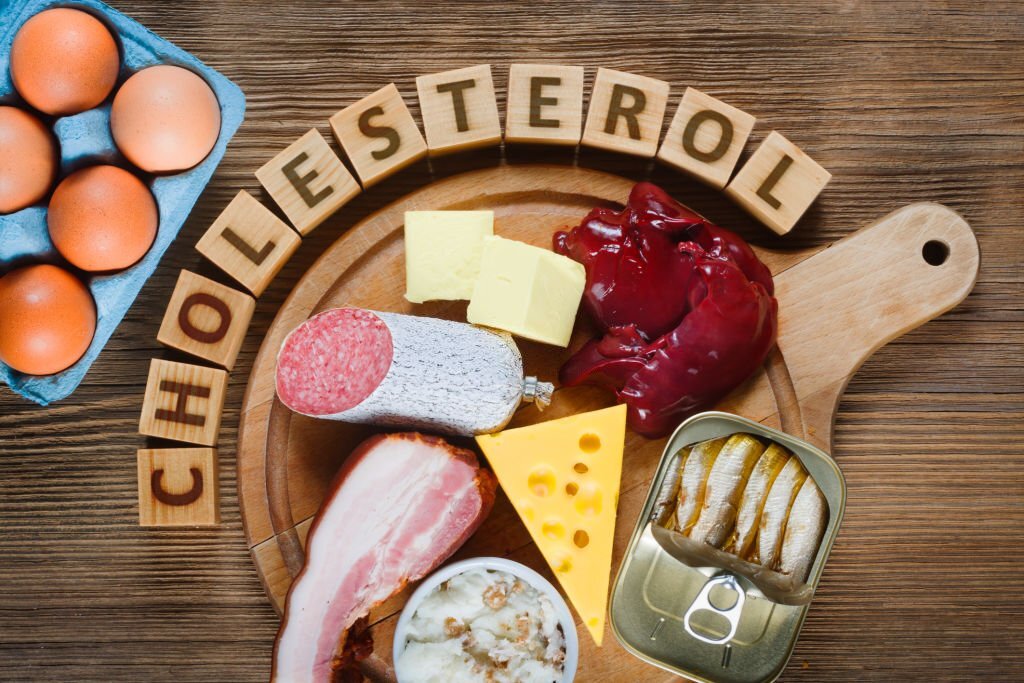
The ketogenic diet is high in fats and low in carbohydrates. When you eat a lot of fat, your body produces more cholesterol.
Does that mean the ketogenic diet raises your risk of heart disease?
Doctors may be skeptical, but research shows that the keto diet doesn’t increase your risk of heart disease or stroke.
On the contrary — it decreases it. Here’s how…
What is Cholesterol?
Before we get into the details, it’s important to understand what cholesterol is.
Cholesterol is a waxy, fat-like substance found in every cell of the body. Our livers make cholesterol, and our bodies need it to function properly. It’s present in every diet. You can find cholesterol in meat, fish, eggs, dairy products, legumes, and other foods.
Cholesterol travels through your bloodstream in small packages called lipoproteins. Triglycerides and other fats are the main ingredients of lipoproteins, and cholesterol is the third most common substance found in them.
There are two types of lipoproteins: HDL and LDL.
HDLs are associated with good health and LDLs with risk factors for heart disease. Low-density lipoproteins (LDLs) carry cholesterol from the liver to your cells.
If you have too much cholesterol in your blood, your LDL levels are too high.
High-density lipoproteins (HDLs) carry cholesterol back to the liver for processing or removal from your body. When you have too much fat in your blood, it’s usually because there are more triglycerides than HDL.
HDL and LDL levels are measured by a simple blood test called a lipid panel. The results of this test can help predict your risk of heart disease and stroke, and they may help determine what kind of diet is best for you.
How Does The Ketogenic Diet Affect Cholesterol?
The ketogenic diet has a few different effects on cholesterol, but most of these aren’t bad for your heart health.
The diet increases your levels of HDL cholesterol, which is the “good” cholesterol that helps your body get rid of excess LDL cholesterol, the “bad” cholesterol that can cause the hardening of the arteries.
When your body is on a high-fat diet, it makes more cholesterol to offset the higher amount of fat in your diet. That’s normal because cholesterol is a fat-like substance.
The ketogenic diet may even decrease your LDL cholesterol in the long run.
One study found that cholesterol levels on the ketogenic diet even out over time. They start out higher, but they gradually decrease to normal levels.
Why Doesn’t The Keto Diet Raise Your Risk of Heart Disease?
First of all, the keto diet doesn’t increase your overall cholesterol levels. It only increases your HDL cholesterol, and even that by a relatively small amount. A high LDL cholesterol level is the only thing that can legitimately be called “bad” cholesterol.
The ketogenic diet increases your HDL levels, but it doesn’t change your LDL cholesterol levels. The kinds of fats found in the keto diet also protect against heart disease. They lower overall blood cholesterol levels and they reduce inflammation.
When the body has inflammation, it creates plaque that can lead to heart attacks and strokes. The fats in the keto diet reduce inflammation, which protects your arteries.
The Benefits of A Keto Diet for Your Heart
Most of the time, a high cholesterol level is actually a good thing. It shows that your body is working hard to get rid of excess cholesterol in your system.
Unfortunately, cholesterol can also turn into plaque in your arteries, leading to heart attacks, strokes, and other dangerous health issues. A high-fat, low-carb diet protects against this.
The fats found in the keto diet are beneficial for your heart health by:
1. Lowering cholesterol levels
The keto diet is high in monounsaturated and polyunsaturated fats, both of which lower your cholesterol levels.
2. Reducing inflammation
Fats found in the keto diet help to reduce inflammation in your arteries and other parts of your body.
3. Protecting your heart
Good fats found in the keto diet have been linked to a lowered risk of strokes and heart disease.
Side Effects of The Keto Diet
The keto diet is healthy, but it’s not without side effects. The most obvious side effect is that you will have to change your diet completely.
Some people may have to give up certain foods completely to make this diet work for them. Eating out could get expensive if you have to order something different from everyone else at the table.
Other possible side effects include:
- Bad breath: Eating more fat means higher production of ketones, which can lead to bad breath.
- Constipation: Eating more fat can cause constipation in some people.
- Dry skin: Eating more fat can lead to dry skin.
- Weak bones: Eating more calcium-rich foods can reduce this risk, but it may take time for your body to actually absorb the calcium.
- Vitamin deficiency: Because the keto diet is low in fruits and vegetables, you may be missing out on several vitamins in these foods.
- Weight gain: For the short-term, there will be an increase in weight as your body metabolizes its glycogen stores.
- Weight loss: It’s more likely that you will lose weight on a low-carb diet like the keto diet.
Summary
The ketogenic diet is high in fats and low in carbohydrates. It also encourages a high intake of healthy fats and a low intake of carbs.
When you eat a lot of fat, your body produces more cholesterol. This isn’t a problem for most people, but it could cause problems for people with certain health conditions.
The keto diet doesn’t increase your risk of heart disease, though. It actually protects against it by lowering your cholesterol levels, reducing inflammation, and increasing your HDL levels.
Side effects may include bad breath, constipation, dry skin, weakness in bones, and a vitamin deficiency. The keto diet is healthy, but it is not without side effects.




